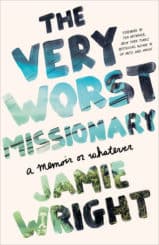
As a Christian college student several decades ago, I knew without a doubt that the holiest, most sanctified majors on campus where those preparing their graduates for overseas missions. This probably explains the small twinges of guilt I felt when others gushed about their longing to serve God on the mission field. Nothing about that vocation seemed appealing to me, nor did the yearly short-term missions trips the college hosted, when vanloads of students travelled to Mexico or flew to other far-away locales to offer children a week of Vacation Bible School, or to build an outdoor baño.
What is wrong with me? I often thought. When my peers shared the many ways God was working through them on the mission field, or how they believed the children living in poverty “only needed to be loved,” I castigated myself for my immediate reaction, for the deep inner eye rolls and for my impatience with my peers’ naiveté, their thinking that parents who are poor must not love their children enough. Why do I have to be so cynical? I wondered. Why can’t I have a similar faith that overseas mission work is changing the world?
Alas, very little has changed about my cynicism regarding the efficacy of missions trips, especially those that focus solely on evangelizing people who are seen as lost or incomplete without the miraculous interventions of those from the West, riding in to save (mostly brown) people from the fiery pits of hell. Perhaps my worldview—and my cynicism—contributed to my wholly embracing Jamie Wright’s memoir (“or whatever”) about what it is like to be the “very worst” overseas missionary, The Very Worst Missionary: A Memoir or Whatever. Indeed, I found her book to be the very best I’ve read about the challenges of mission work, and the ways missionary institutions are broken, their methods of operation damaging both to missionaries and to the communities they intend to serve.
Very little has changed about my cynicism regarding the efficacy of missions trips, especially those that focus solely on evangelizing people who are seen as lost or incomplete without the miraculous interventions of those from the West.
Wright begins her memoir by sharing the genesis of her moniker as the very worst missionary. Newly arrived in Costa Rica with her husband and three sons to work as missionaries, Wright describes the moment when her blog turned away from an all-is-well veneer to tell the truth about her experience: that it wasn’t picture-perfect. A post, dated October 2009, detailed a harrowing moment when she discovered a lizard in the pants she was wearing, and how this moment was the “last straw” in what had up to that point not been a good missionary adventure. The blog post used unexpected phrases like “Sh*t Balls Help Me;” it used a bit of potty humor; it described Wright’s honest struggles with the missionary life. And it displeased a supporter, who said Wright was “tarnishing the reputation of missionaries everywhere,” that she was blaspheming, that she was “the worst kind of missionary.”
A personal identity, a blog title, a social media handle, and a book were thus born, leading in turn to a significant vocation as a reformer of Christian missions.
The beginning of Wright’s memoir narrates her upbringing in a home that was “Jew-ish,” but that gave her a foundational understanding of God, while also keeping her away from the Christian institutions that can sometimes distort and entrench negative faith messages. Wright’s teen years were difficult, and she struggled to find stability despite undiagnosed mental illness (for herself, and for her parents), truancy, failing out of high school, and an unintended pregnancy. Following the birth of their first son, Wright married the father, Steve, then a college football player; and together they would have two more children, find a church home, and answer what they believed was a call to mission work in Costa Rica, where their rose-colored glasses about the mission field would be shattered completely.
Using the family’s experience in Costa Rica as a frame, The Very Worst Missionary deconstructs the problematic aspects of foreign missions as well as the ideologies that often drive mission work. For example, Wright describes the vetting process many missions organizations use to recruit staff, and why that process sometimes allows people to serve who have few other qualifications or training, other than merely raising their hands and saying “pick me.” Those who say that God is “calling them” to the field have an easy in, because who is going to argue with that call?
Certainly some missions organizations have extensive training, but for Wright and her husband, six months of Spanish instruction and five weeks of orientation would be all the preparation they apparently needed to sell all they owned, uproot their family, and begin work in another country. Wright followed up with a year in a language school while in Costa Rica and her husband began working in the field. While she was studying, she concluded there were several kinds of missionaries: some truly committed to their call, some who were “total weirdos with terrible interpersonal skills,” and some who were “self-righteous [redacted] who honestly believed they were so amazing Jesus needed them to save the world.”
Her interactions with these latter folks began to confirm her sense that there was something systemically wrong with the way missions organizations worked. She writes that Christians need to recognize, “we have a responsibility as the church to choose whom we send, so that we send the right people to do the right things in the right places—and to not send them when it’s not right.” Wright wondered what other parts of the system were broken, and whether she and her husband had uncovered something about missionary institutions that “could get us killed in our sleep.”
In subsequent years, the Wrights would discover other troubling aspects of missions work, which The Very Worst Missionary unpacks in ways that are both funny and sad, thoughtful and honest, and significantly, challenging to many Christian paradigms of what missionary life might be like. I appreciate Wright’s willingness to call out institutions and ideologies that we might consider sacrosanct, recognizing that Western efforts to reach those living in poverty are not unalloyed, nor are they always welcomed—or even needed.
I appreciate Wright’s willingness to call out institutions and ideologies that we might consider sacrosanct, recognizing that Western efforts to reach those living in poverty are not unalloyed, nor are they always welcomed—or even needed.
The Very Worst Missionary is an entertaining read. Wright is an excellent writer, and while some of her observations were laugh-out-loud funny, her ability to construct a well-turned sentence makes the memoir one that readers will want to savor. Fundamentally, I appreciate Wright’s vulnerability and her willingness to state uncomfortable truths about Christian missions, while also offering a vision for what can be right and good about working in another culture, especially in terms of the communities that can form when people are open to simply loving others as they are without any motive to “save” them. This, it seems, is ultimately the work to which we are called, a belief Wright returns to again and again in her memoir. And for that, I am grateful.
Melanie Springer Mock is a Professor of English at George Fox University, Newberg, Oregon. She is also the author or co-author of five books including, most recently, Worthy: Finding Yourself in a World Expecting Someone Else(Herald Press, 2018). Her essays and reviews have appeared in The Nation, Christianity Today, The Chronicle of Higher Education, and Mennonite World Review, among other places.

